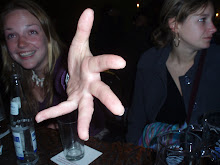"Imagine a football field, filled with a rainforest. Each branch is the width of a hair. That is something like the complexity of your mind," said the neuroscientist to the crowd.
Later he said, "the data we will compile will be more than the project to map the skies."
"Your inner starscape is quite complicated," he said.
A word like "starscape" can't be brought indoors, so you say good-bye to your friend by the absent piano and bike off around the plaza.
Cruise out down Vanderbilt and gain momentum; rolling stops at the lights. Then ratchet up the gears and push your way back up to speed as you descend past the shuttered shops.
It takes 10 minutes or so to gain the ascent to the Manhattan Bridge. The slope begins blocks away, by the apartment houses that always have a group of people howling around a set of speakers. Once, someone threw a basketball in front of your tires, but tonight they laugh and no one pays you any mind.
The men in the fancy biking gear pass you from time to time, calf muscles sliding up and down beneath their skin along tight tendons. Let them pass.
The bridge begins to lift you gently out of the city. The Jehovah's Witnesses' Watchtower goes by, glaring. Parking lots slide beneath you.
Slip the gears down and settle in to the pulse of moving up the bridge. The air cools and the East River opens up beneath you. Every pedal gains you a broader view of the city skyline, measured and complex. Lights on and lights off. Signifiers, some whose significations you know -- this building, that building -- some which are mysteries. Some which may not signify anything except to the people within, with their hands on the light switches.
Up this high over the water, this late, it is possible to feel both alone and together, each in the most satisfying way. The lights blaze out from the rooms filled with thoughts. Every small spot of light reaches out to you and repeats, "I am here, I am here."
The cars rumble on the raised roadway above you. If you stopped for a moment, you could feel the bridge shake. But you don't.
The D train clatters along beside the bike track. Returning to Brooklyn, you can race it to the land. Once, you kept pace for nearly three quarters of the bridge. There was an old man in a fedora leaning against the window, and you kept your eyes on that hat as the speed brought you closer and closer to giddiness.
In this direction though, towards Manhattan, you meet the trains head on and they pass quickly, screaming vessels filled with ruminations, and newspaper articles, and shopping lists, and conversations whispered and yelled.
And as the bridge lifts you up, you are lifted by this tide: the lights on and off, the heavy cars, the minds on rails.
On the bike path, though, you are alone with the air, and your starscape mind. The East River moves beneath you. From this height, in this darkness, it seems stately and silver.
As you pass the apex, you move up through the gears and push the bike faster. Soon you catch the descent and your momentum grows.
The overhead lights are spaced a few meters apart. As you pass under and beyond each one, you see your shadow appear before you, poised as if jumping, delicate, one leg raised. And you move faster, and the shadow self lengthens, and fades. You, dancing larger, leaping further, until suddenly you disappear; mirror self pulled back to substance, only to appear again, as if drawn back like Peter Pan's needle-pointed shadow, to begin growing and pulling away again under the glare of the next light.
Coast down. Gain speed. Ignore the bumps, take them bravely. Square your shoulders and curve your back, and feel the wind filling your torso like a sail. Keep your eyes on the skyline.
If a single mind is like a rainforest, what is a city like this? If a mind is a starscape, then how many universes exist here, where the lights go on and off, and each one is unique?
Swing down off the bridge and up into the East Village. Catch the snippets of conversation on the street. Sit down at a cafe, order a beer, and pull out your notebook. Write down what you can of the feelings you've had -- keep what you can. Time looks slow and stately, even silver, from afar. But when you're in it, it's far too fast and far too murky. So catch what you can, there in the middle of the night.

